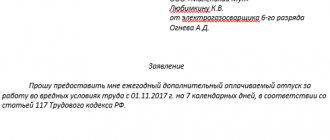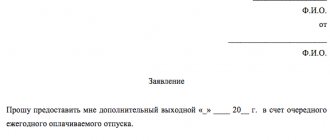Author of the article: Anastasia Ivanova Last modified: January 2021 23933
In 2021, changes were made to the civil service legislation. They note several innovations at once. First of all, they relate to the duration of rest time and methods of payment. Vacation leave for civil servants is determined by length of service, working conditions and other factors. What is the procedure for providing and duration of rest time?
Legislative acts
Leaves for citizens in the civil service are determined by Law No. 79-FZ of July 27, 2004. Changes have been made to it in 2021. The duration of rest and accrual were supplemented by Law No. 176-FZ of June 2, 2016.
According to legislative acts, leave is issued under the following conditions:
- Rest time is determined by the schedule drawn up by the organization 2 weeks before the start of the calendar year.
- The vacation can be divided into several parts. Moreover, one of them cannot be shorter than two weeks.
- A civil servant must rest at least 4 weeks per calendar year. If the need arises, he has the opportunity to transfer the part exceeding this time to the next year or receive monetary compensation instead.
An official has the right to take unscheduled leave if there are special reasons for this. For example, when the wife of a civil servant is on maternity leave.
According to legislative acts, in addition to the main vacation, employees involved in the public service can receive additional days of rest. Their number is affected by:
- length of service;
- performing official duties in hazardous conditions;
- irregular working hours;
- service in non-standard climatic conditions.
Calculation of the duration of rest time must be carried out every year, as length of service or other circumstances may change.
Additional guarantees for civil servants
Activities related to public service have certain costs that are subject to compensation. At the same time, costs mean a set of prohibitions and requirements that impose significant restrictions on the lives of civil servants. In Russia, this compensation is guaranteed at the state level: government employees are provided with special benefits and preferences.
Chapter II of Law No. 79-FZ of July 27, 2004 provides a list of compensations. The legislation considers them as state guarantees in order to ensure:
- increasing the service motivation of civil servants;
- social and legal protection of specialists;
- strengthening staffing;
- minimizing corruption.
It is customary to distinguish between a main and an additional group of state guarantees. The main group is intended for all categories of civil servants, the additional group is for specialists from individual regions or government bodies. Among the guarantees are:
- optimization of service procedures;
- establishing scientifically based labor standards;
- ensuring labor protection;
- optimization of work and rest schedules.
Optimization of rest and work schedules is achieved thanks to:
- establishing temporary boundaries of work activity (40-hour work week);
- allocation of holidays and non-working days;
- provision of annual leave, including additional ones.
Duration of main rest time
The number of days that government employees can rest is 30 days. But thanks to the additional days, the average vacation duration reaches up to 6 weeks.
Expert commentary
Potapova Svetlana
Lawyer
Initially, it was envisaged that senior officials in the civil service would rest several days more than ordinary employees. But the changes made in 2021 have made everyone equal. The basic leave of officials has become the same for all categories, regardless of their position, and is 30 days.
Additional vacation days
Civil servants may apply for additional days of vacation, both paid and unpaid. In the latter case, the employer provides rest based on the official’s personal application and the presence of extenuating circumstances. These include:
- Spa treatment;
- family circumstances (illness of relatives, etc.);
- training in secondary vocational or higher education programs;
- performing social workloads, etc.
Employees are provided with additional days of vacation, which are subject to payment. Their number depends on various factors.
Reduction of vacation for civil servants
Given the increase in wages for civil servants from 2021, the duration of the usual vacation may be slightly reduced. By the way, in the draft direction of Russia's budget policy in 2015-2017, it is planned to significantly optimize budget expenditures for wages, taking into account the reduction in the total number of employees of government departments.
It is also worth recalling that next year all expenses for remuneration of civil servants in the Russian Federation should be based on the actual number. At the same time, funding for vacant positions is limited to 10% of the actual number of employees.
As has already become clear, all these innovations should significantly optimize expenses from the Russian treasury for the maintenance of federal bodies.
Long service leave
Length of service represents continuous length of service in a position, for which benefits and additional guarantees are applied. According to labor legislation and legal acts in the field of public service, additional days of rest are due for length of service:
| Civil service experience | Number of additional days of rest |
| from 1 year to 5 years | 1 calendar day |
| from 5 to 10 years | 5 calendar days |
| from 10 to 15 years | 7 calendar days |
| from 15 years old | 10 calendar days |
Important! In this case, only length of service in the public service is taken into account. Work experience in other industries is not taken into account. Additional days for length of service are added to the main vacation.
The essence of the changes in 2021
The changes affected the 45th and 46th articles of the mentioned federal law. IN
in particular, a separate Federal Law was issued under number 418 in December 2015, and a Federal Law under number 176 at the beginning of June 2021.
According to the latest amendments, the length of vacation periods for all categories of employees without exception has been revised.
The additional vacation period granted for length of service is now calculated in a new way. Until 2021, when registering it, three main parameters were taken into account; accordingly, the duration depended:
- from the (current) position held by the official or employee;
- from the total number of years devoted to public service (length of service);
- from having an irregular work schedule (for example, the need to be present at the workplace on holidays and weekends).
After changes have been made to federal legislation, the provision of vacation periods will be carried out according to uniform standards.
The annual (main) paid vacation period has been reduced to 30 days . Previously, 35-45 days of rest were paid for senior employees and 28-30 days for ordinary employees. The amendments made it possible to ensure equal treatment of the state towards all persons engaged in public service.
Additional days of paid rest now depend on the length of service or length of service and are calculated as follows:
- working for the state for one to five years allows you to get an additional day of rest;
- experience from five to ten years is the basis for accruing five additional days;
- work for ten to fifteen years is “valued” by the state at an additional seven days of rest;
- with solid experience of more than fifteen years, the employee can count on receiving ten additional days.

But the minimum quantity is 3 days. As a result of amendments made to federal legislation, the total duration of vacation periods within one year for employees now ranges from 30 to 43 days (calendar days are taken into account, not working days).
Preferential accrual of additional vacation days has been preserved for persons engaged in labor activities in particularly difficult or harmful conditions. For example, according to Law No. 4520-1, for employees engaged in work activities in special climatic conditions, an additional vacation period is accrued as follows:
- workers in the Far North can count on 24 additional days of rest;
- persons engaged in labor activities in territories close in climatic conditions to the North receive an additional 16 days of rest;
- persons working in the northern regions with an established salary supplement (regional coefficient) can take eight more days in addition to the main vacation period.
Rest for irregular working hours
Many civil service employees work irregular working hours (Article 101 of the Labor Code of the Russian Federation). This means that, at the direction of the employer, employees must go outside of their working hours. Positions that can be assigned this mode of operation are specified in the local regulations of the organization.
Such employees perform their duties according to the general procedures adopted in the institution. But at the same time, if production needs arise, they can start the working day earlier or stay late after it ends. Civil servants belonging to this category are given 3 additional days of rest.
Other grounds for additional leave
Additional leave is provided when performing duties in harmful or dangerous working conditions. This point is regulated by labor legislation (Article 117 of the Labor Code of the Russian Federation). A civil servant in this category is provided with an additional 7 paid days.
Expert commentary
Kireev Maxim
Lawyer
When working in the Far North, 24 calendar days are required for vacation (Article 321 of the Labor Code of the Russian Federation). In the case where the area is only equivalent to it in terms of climatic conditions, the employee will be able to rest additionally only for 16 days. For civil servants in regions where the northern bonus is issued, 8 days are added to their vacation.
Payments for vacation
The basis for calculating vacation pay is Government Decree No. 562 of September 6, 2007. Additionally, the employer’s financial obligations are stipulated in Law No. 79-FZ of July 27, 2004.
Vacation payments are calculated taking into account:
- established salary in accordance with service class;
- salary for the replacement position;
- additional payments received.
Civil servants are entitled to payments that form their wages in addition to their salary. They can be prescribed on various grounds:
- for length of service;
- as financial assistance;
- bonus payments;
- for special or harmful working conditions.
Payment is made in a lump sum. The employee must receive vacation pay no later than 10 days before the start of the vacation. If this point is violated, the employer may be subject to administrative liability. That is why, if an employee wants to take a vacation out of turn, he may be offered to arrange a vacation at his own expense before doing so.
For some categories of civil servants, the procedure for calculating vacation pay includes financial assistance and one-time payments. In general, the amount of funds is calculated using the formula: salary is divided by 29.3 average days and multiplied by the number of vacation days.
How is vacation pay calculated and when is it paid?
Of course, first of all, the vacation time must be agreed upon with management so that the vacation of a particular civil servant is included in the appropriate schedule in the institution.
Two weeks before the start of the vacation, the employee receives written notice, or a reminder, about the future vacation. Ten days before the start of the vacation, the employee receives vacation pay. For example, if vacation begins on July 15, then vacation pay must be paid no later than July 5, otherwise the employee has the right to compensation for each day of delay.
By the way, paying vacation pay earlier than the due date is not a violation, therefore, in cases where the deadline for paying vacation pay falls on a weekend, vacation pay should be issued on the Friday before that weekend, but not on the Monday after it.
When calculating the amount of vacation pay, not only the employee’s income for the last year in the form of salary, but also bonuses for particularly important and complex tasks and financial assistance should be taken into account. For this purpose, the size of each such bonus is divided by 12, the resulting result is added to the amount of vacation pay.
Procedure for granting leave
Annual paid leave is provided according to a schedule drawn up annually by the organization. In this case, the features of its design should be taken into account:
- Leave is granted no earlier than 11 months after joining the civil service. The exception is pregnant women or officials who have transferred from another government agency.
- If during a vacation an official is on sick leave, then the rest period is extended by the same number of days or transferred to any other convenient dates.
- Additional vacation days are provided in addition to the main one.
- Rest time cannot be replaced with monetary compensation. The exception is the dismissal of an employee from a government position.
- Due to operational necessity, the main rest time can be postponed to the next period, but this requires the consent of the official. Part of the rest time must be used no later than 1 year after the right to it becomes available.
- A civil servant cannot fail to take basic leave for 2 years in a row.
Expert commentary
Kamensky Yuri
Lawyer
If an official takes leave without pay, then his position is retained for the entire duration of the leave. Such leave can last from several days to one year if there is a good reason and at the discretion of the employer.
Reasons for the reform
Experts see the prerequisites for innovation in the current economic situation. Difficulties in filling the federal and regional treasuries dictate their own rules, the main ones being funding cuts, personnel optimization, and vacation reductions. Civil servants were no exception, and many public figures noticed that the reform was soft. A minimum rest period of 30 days is a fairly respectable period with a not very tiring schedule and responsibilities.
Don't miss: Matkapital: one-time payment
According to the calculations of financiers, the reform carried out will allow saving up to 3 billion rubles from the budget annually. These funds are planned to be used for socio-economic programs, in particular for increasing salaries for public sector employees, repairing and constructing medical institutions, and modernizing infrastructure. Also, the new rules for the formation of vacations will help to significantly reduce social tension, because in Russian society for several decades the stereotype about the rich and easy life of officials has prevailed.







